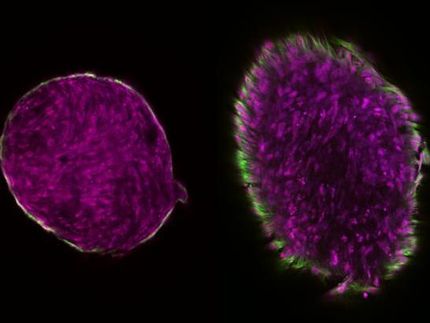Studies show Geron's stem cell therapeutic for spinal cord injury produces nerve growth factors
Geron Corporation reported that studies show GRNOPC1, the company's human embryonic stem cell (hESC)-based oligodendroglial progenitor therapeutic, produces multiple nerve growth factors, proteins that stimulate the survival and regeneration of neurons damaged during spinal cord injury.
The studies conducted by Geron scientists describe a newly discovered neurotrophic effect that, in addition to the previously documented in vivo remyelinating activity of these cells, serves as a second mechanism of action that demonstrates the product's beneficial effects when injected into animal models of acute spinal cord injury.
"The work extends our knowledge of the multiple biological activities of GRNOPC1," stated Thomas B. Okarma, Ph.D., M.D., Geron's president and chief executive officer. "In addition to the remyelinating activity as previously reported, GRNOPC1 produces growth factors that can improve the survival and extension of neuronal circuitry in the spinal cord. The multiple functions of GRNOPC1 affirm the potential therapeutic utility of our cell-based approach to the repair of spinal cord injury and provide multiple mechanisms within a single therapy to achieve functional recovery."
In the published studies, GRNOPC1 was found to produce numerous neurotrophic factors, including transforming growth factor beta-1 (TGF-beta 1), transforming growth factor beta-2 (TGF-beta 2), activin A, midkine, vascular endothelial growth factor (VEGF) and hepatocyte growth factor (HGF). These factors were all produced at physiologically active levels, and each has been reported to have trophic effects on neurons associated with the spinal cord.
The studies also demonstrate that neurotrophic factors produced by GRNOPC1 are biologically active. When culture medium used to grow GRNOPC1 was applied to adult rat sensory neurons, sprouts called "neurites" emerged from the rat neurons. Media that had not been exposed to GRNOPC1 stimulated significantly less neurite outgrowth.
Original publication: Stem Cells and Development, Vol. 15, Issue 6, 943-952.
Organizations
Other news from the department science

Get the life science industry in your inbox
By submitting this form you agree that LUMITOS AG will send you the newsletter(s) selected above by email. Your data will not be passed on to third parties. Your data will be stored and processed in accordance with our data protection regulations. LUMITOS may contact you by email for the purpose of advertising or market and opinion surveys. You can revoke your consent at any time without giving reasons to LUMITOS AG, Ernst-Augustin-Str. 2, 12489 Berlin, Germany or by e-mail at revoke@lumitos.com with effect for the future. In addition, each email contains a link to unsubscribe from the corresponding newsletter.























































